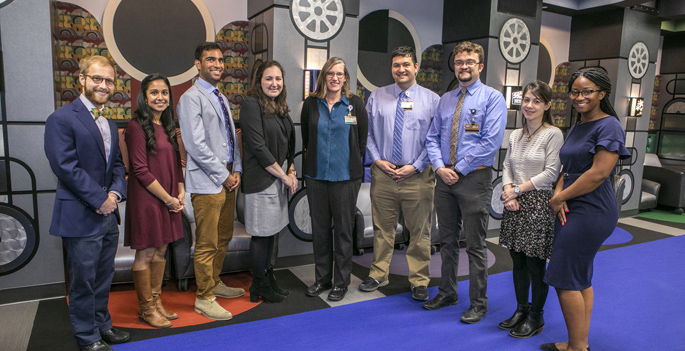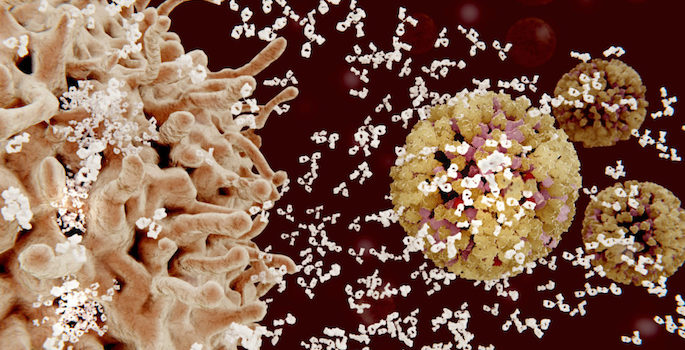Health And Medicine
-

Probing H. pylori cancer protein
Timothy Cover, john Loh and colleagues have identified how a certain type of mutation influences the risk of premalignant and malignant changes in the stomach. Read MoreFeb 15, 2019
-

Reversing stress-related anxiety
Inhibiting COX-2 — an enzyme associated with inflammation — could provide a novel therapeutic approach for stress-related psychiatric disorders. Read MoreFeb 14, 2019
-

Major initiative launched to advance the application of AI to health care
IBM Watson Health has announced plans to make a 10-year, $50 million investment in joint research collaborations with Vanderbilt University Medical Center and Brigham and Women’s Hospital to advance the science of artificial intelligence and its application to major public health issues. Read MoreFeb 13, 2019
-

Researchers push forward frontiers of vaccine science
Using sophisticated gene sequencing and computing techniques, Vanderbilt researchers have achieved a first-of-its-kind glimpse into how the body’s immune system gears up to fight off infection. Read MoreFeb 13, 2019
-

Women’s hormones play role in drug addiction, higher relapse rates
But long before female-specific medications are available, treatment centers could use the information in this study to educate women about their stronger mental connections to places and objects. Read MoreFeb 8, 2019
-

Symposium shines light on research by medical students
The symposium featured research by students in Vanderbilt's Medical Scholars Program, a one-year, in-depth research experience available to Vanderbilt and Meharry Medical College students with the central goal of training leaders in academic medicine. Read MoreFeb 8, 2019
-

New option could increase minority kidney transplants
People with blood type B, a relatively rare blood type, can expect similar outcomes from kidney transplants from type A2 donors, which increases the number of available kidneys for these patients. However, it requires additional monitoring and medication that can raise costs for patients. Read MoreFeb 7, 2019
-

New target for chronic kidney disease
Craig Brooks and colleagues have identified a mechanism of kidney fibrosis progression, suggesting a potential new angle for treating chronic kidney disease. Read MoreJan 31, 2019
-

Study finds patient messages help predict medication adherence
Zhijun Yin and colleagues have found that breast cancer patients who message their doctors about certain topics are more likely to discontinue hormone therapy than others--which enables doctors to better predict which patients are at risk of stopping their treatment early. Read MoreJan 31, 2019
-

Research bolsters thyroid function, atrial fibrillation link
Jonathan Mosley and colleagues have found that genetic varations in thyroid function can increase the risk of an irregular heart rhythm. Read MoreJan 31, 2019
-

Study explores genetic risk for suicide attempt
While there is no single culprit, genetic factors account for a small but significant percentage of an individual's suicide risk. Read MoreJan 31, 2019
-

Designing antibodies to fight the flu
James Crowe Jr. and colleagues have developed a new computational method that may allow researchers to develop flu antibodies that can protect against more strains of the disease. Read MoreJan 31, 2019
-

In utero antibiotics and obesity risk
Exposure to antibiotics during pregnancy does not raise the risk of obesity in children. Read MoreJan 31, 2019
-

Destructive ‘telegrams’ in asthma
Heather Pua and colleagues have identified the source of cellular signals that may play a role in triggering an asthma attack. Read MoreJan 31, 2019
-

Long-term unemployment linked to increase in babies born with drug withdrawal
Babies born with neonatal abstinence syndrome are more likely to be delivered in regions of the U.S. with high rates of long-term unemployment and lower levels of mental health services. Read MoreJan 30, 2019
-

Major grant to bolster research on inflammation-related cancers
Cancer Research UK has awarded a 20-million-pound grant (about $26 million U.S.) to a team of international investigators, including Vanderbilt’s James Goldenring, Eunyoung Choi and Jimin Min to study inflammation-related cancers. Read MoreJan 25, 2019
-

Study to track teen development in those with, without autism
A new Vanderbilt study examining stress in teens with and without autism spectrum disorder is now enrolling participants, thanks to a $2.3 million, five-year grant from the National Institute of Mental Health. Read MoreJan 25, 2019
-

VUMC scientists ‘sprint’ to find anti-Zika antibodies
Scientists at Vanderbilt University Medical Center and colleagues in Boston, Seattle and St. Louis are racing to develop — in a mere 90 days — a protective antibody-based treatment that can stop the spread of the Zika virus. Read MoreJan 25, 2019
-

Study finds unique form of chronic sinusitis in older patients
Older patients with a diagnosis of chronic sinusitis have a unique inflammatory signature that may render them less responsive to steroid treatment, according to new research led by Justin Turner. Read MoreJan 18, 2019
-

DNA’s on/off switch
Walter Chazin and colleagues have identified how a chemical "switch" in DNA primase, an enzyme essential to the replication of our genomes, works in order to hand off genetic information to the next enzyme. Read MoreJan 18, 2019